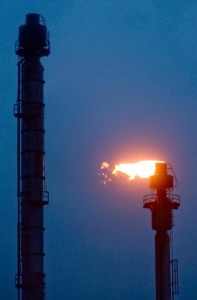The Texas Plant That Polluted for Years, and a Whistleblower That Helped Expose It

Photo by Matthew HINTON/AFP/Getty Images
In a new story on a metal refining plant in Freeport, a reporter for Texas Observer finds repeated environmental and regulatory offenses.
Cooked books, pollution controls cobbled together with duct tape, and holes burned in the ceiling by ammonia and chloride. A furnace design from the 1800s. Arsenic and nickel sent into the air, less than a mile away from an elementary school. Pollutants pumped into the Brazos River. Those are just a few of the problems found over time at the Gulf Chemical plant in Freeport, Texas.
For the Texas Observer, reporter Forrest Wilder has the story of what he calls “Texas’ most brazen polluter:”
“An Observer review of thousands of pages of court records and internal agency documents, and interviews with a former company executive reveals a company that operated outside the law for almost four decades, even as citizens, activists and TCEQ’s own investigators pleaded for action. The records and interviews show a facility that held its pollution control equipment together with duct tape and routinely pumped out hazardous metals including nickel, vanadium, and molybdenum in quantities considered potentially harmful to nearby neighborhoods and an elementary school less than a mile from the plant. A former Gulf executive and a former TCEQ official described to the Observer how the company blatantly polluted for years and got away with it.”
Now the company is being pursued by the Texas Commission on Environmental Quality (TCEQ) and state Attorney General, but some feel they aren’t doing enough. Wilder also reports that “the company has missed a deadline for putting a system in place to monitor its stacks’ emissions in real-time.” It’s an important story, one that speaks to many of the issues surrounding refining and regulation in Texas.
